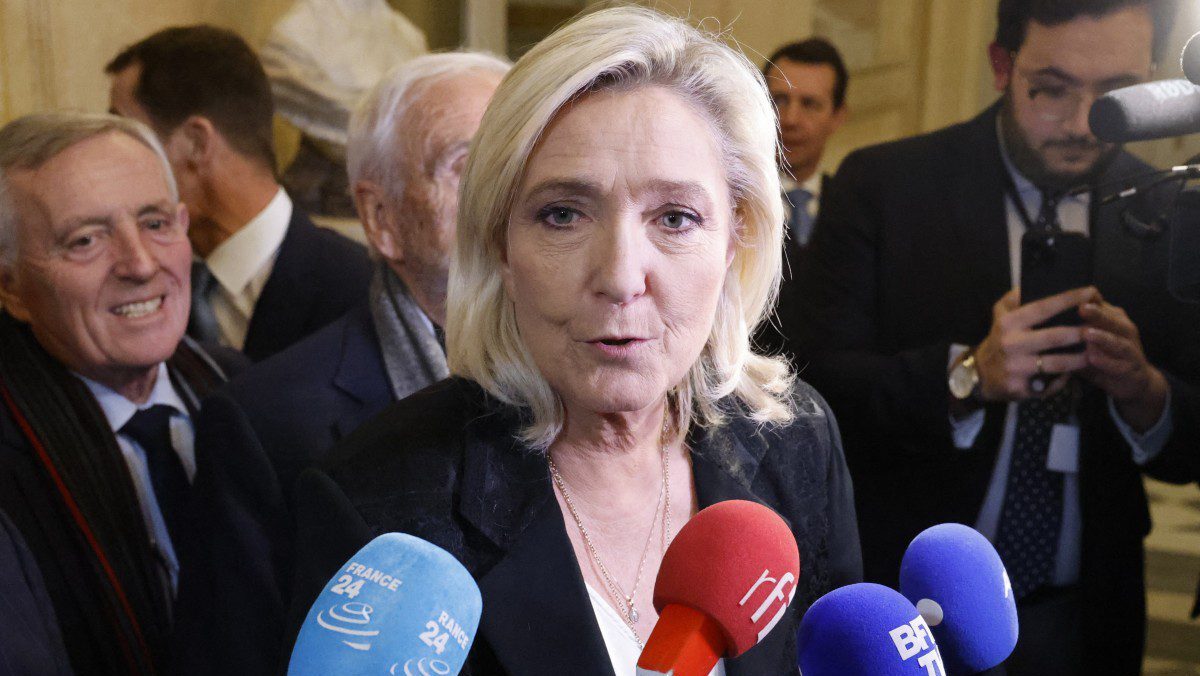
French Member of Parliament and President of the ‘Rassemblement National’ (RN) group Marine Le Pen answers journalists after a debate on the draft law to control immigration at the National Assembly in Paris on December 11, 2023.
Photo: Ludovic MARIN / AFP
While Marine Le Pen’s Rassemblement National party has made significant gains in popularity among the French public during the debates on the immigration law, it has been the target of a new salvo of attacks denouncing its alleged links with Vladimir Putin’s Russia, with the aim of weakening the party that constitutes the leading opposition to Emmanuel Macron.
At the root of this offensive is a lengthy investigation published in the Washington Post on Saturday, December 30th, which claims that the Rassemblement National is under Moscow’s influence, with the aim of “undermining French support for Ukraine.” The American newspaper claims to be relying on “Kremlin documents obtained by a European security service,” without giving any further details. These documents allegedly analyse the methods used by Vladimir Putin to increase his influence in Europe, using “social media” on the one hand and European ‘far-right’ parties on the other.
For example, the investigation is targeting a former RN MEP, Jean-Luc Schaffauser, who is accused of renting a floor of his Strasbourg residence to the number two man in the Russian embassy in France, a diplomat who sat on the Council of Europe until Russia was expelled in March 2022.
The Washington Post article is just the latest in a long series of accusations made against the Rassemblement National over the past few months, through investigations published by the newspaper Le Monde and the investigative media Mediapart. An investigative committee into foreign influence was also launched at the request of MPs from Renaissance, Emmanuel Macron’s party. In June, the Macronist rapporteur for this parliamentary committee described the RN as Russia’s “transmission belt,” and criticised it mainly for its submission to the “Russian discourse” at the time of Russia’s annexation of Crimea in 2014. For Renaissance, the Washington Post article merely confirms these long-standing facts: the RN is nothing more than “the Kremlin’s mouthpiece in France” and “plays a leading role in relaying Putin’s propaganda.” On X, Renaissance spokesman Loïc Signor shared a ‘deep fake’ video featuring Marine Le Pen’s 2024 greetings in Russian, using artificial intelligence, with the hashtag #MarinePoutine.
There is a certain inconsistency underlying the latest survey: To consider that the Rassemblement National’s supposedly pro-Russian viewpoint would be likely to “undermine French support for Ukraine” is tantamount to lending inordinate influence to the Rassemblement National, which currently has absolutely zero political means to influence France’s foreign policy on the Ukraine issue, which is decided entirely by Emmanuel Macron and his entourage.
The spokesman for the Rassemblement National, Laurent Jacobelli, met the investigation with vigorous denials and on Tuesday, January 2nd denounced a “cabal” against his party. The MP recalled that his party had unambiguously condemned Russia’s aggression against Ukraine from the outset, and spelled out his party’s position on the conflict that began in February 2022: support for Ukraine, the aggressed country, against Russia, the aggressor country, but a refusal of embargoes against Russia, deemed “useless,” or of “offensive arms aid” to Kyiv, deemed a “bad solution.”
For Renaissance, with around five months to go before the European elections, this is an excellent opportunity to wave a red rag to dissuade voters who might be tempted to vote for the Rassemblement National: “Next June, Jordan Bardella will head the list for the Rassemblement National. The same man who has been relentlessly relaying Putin’s talking points since the Russian invasion,” reads the official X account of the presidential party.
